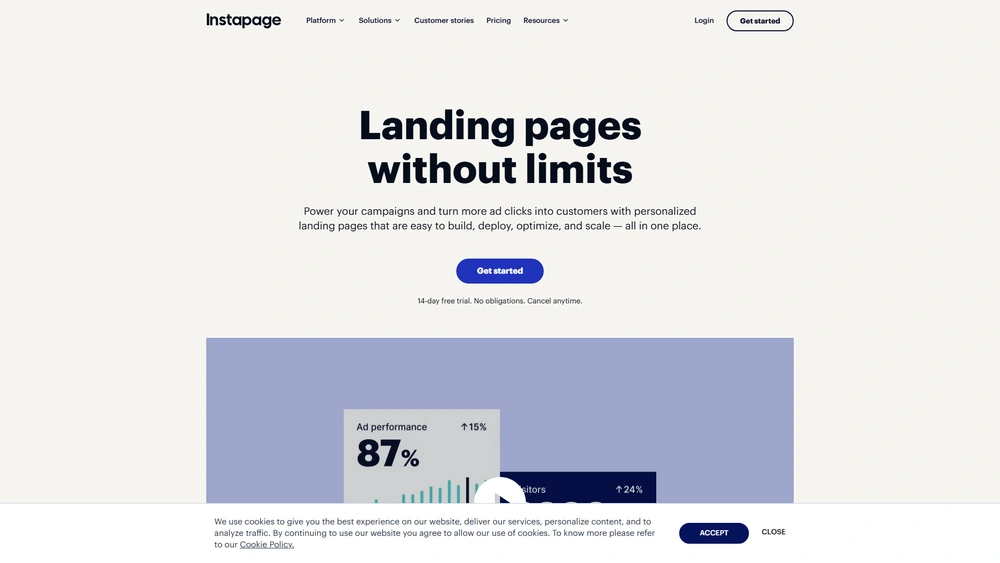Instapage Overview & 2026 Industry Position
Instapage is a landing page platform built to convert—literally. Positioned at the intersection of intelligent design, performance marketing, and real-time personalization, Instapage has emerged as a powerful tool in the 2025 marketing stack. In an era where paid ad budgets are scrutinized and conversion rates are everything, Instapage equips growth marketers with rapid deployment, A/B testing, and AI-assisted content tuning capabilities that drive immediate results. Its solutions are primed for agencies, SaaS businesses, and high-velocity B2B funnels seeking quicker time-to-value from every visitor touchpoint.
From Launch to 2026 Journey
Founded in 2012, Instapage was designed to simplify landing page creation while maximizing paid ad ROI. The early platform gained traction among performance marketers for its A/B testing and post-click optimization focus. Key milestones include:
- 2015: First major UI overhaul and release of Instablocks system
- 2017: Enterprise plan launched with AMP support and AdMap
- 2019: Acquired by Postclick Inc. to scale personalization at scale
- 2022: Introduced server-side experimentation engine
- 2024: Rolled out AI content rewriting for landing pages and funnels
Heading into 2026, Instapage’s strategy centers on 1:1 personalization at scale, pairing predictive AI with industry-specific conversion flows that make landing pages dynamic, not static.

Instapage Key Features
Instapage isn’t just a builder—it’s a conversion engine. Key features in the 2025 suite include:
- Landing Page Builder: 100% drag-and-drop WYSIWYG with instant mobile responsiveness
- Instablocks: Save and reuse content blocks across campaigns
- AdMap: Visual map of ad-to-page connections for optimization insights
- Experimentation Engine: Native A/B & multivariate testing with server-side stability
- AI Content Suggestions: Rewrite or localize copy dynamically using intent models
- Dynamic Text Replacement: Adjust headlines/subtext to individual UTM variables
- Heatmaps: Built-in visual analytics for scroll depth and engagement
Workflow & UX
Instapage’s user experience scores high for clarity, modularity, and responsiveness. New campaigns begin with a template or empty canvas. Core UX strengths include:
- Drag-and-drop placement: Truly freeform editing without restrictive grids
- Version control: Rollback saved page states anytime
- Team Collaboration: Flexible access management and comment threads
- Real-time Editing: See changes instantly across breakpoints
- No-code Override: Add custom CSS or scripts per campaign
Overall, the workflow promotes experimentation, with time-to-launch measured in hours—not days.
Instapage Pricing Analysis & Value Metrics
As of July 2026, Instapage offers simple tiered pricing with enterprise customization.
| Plan | Price (USD/month) | Key Inclusions |
|---|---|---|
| Build | $99 | Unlimited pages, 1 workspace, AI point-editing |
| Convert | $249 | All Build features + personalization & heatmaps |
| Ignite | Custom | All Convert + dedicated CSM, API, SSO |
Value Metric: Pricing is tied to usage caps (traffic, domains, workspaces), making scaling predictable. The Convert plan hits the sweet spot for growing teams with active paid media strategies.
Competitive Landscape
Here’s how Instapage compares with its nearest competitors:
| Platform | Best For | Starting Price | USP |
|---|---|---|---|
| Instapage | Performance marketing campaigns | $99 | AI personalization + conversion-specific UX |
| Unbounce | SMBs & contractors | $74 | SmartBuilder automation |
| ClickFunnels | Course sellers & infopreneurs | $147 | Funnel chains with email tools |
| Webflow | Designers & web agencies | $14 | Pixel-level design control |
Main Use Cases
Instapage shines in scenarios requiring fast creation and ROI accountability:
- High-volume SEM and Facebook Ad landing pages
- Lead capture for SaaS, B2B, fintech and legal firms
- Agencies managing dozens of client microsites
- SaaS onboarding flows connected to CRMs or demos
Instapage Integrations
Instapage connects seamlessly with:
- Analytics: Google Tag Manager, Segment, Heap
- Email & CRM: HubSpot, ActiveCampaign, Mailchimp, Salesforce
- E-commerce: Stripe, Shopify, PayPal embed-compatible
- Ad Platforms: Google Ads, Meta Business, LinkedIn Ads
- Zapier: Connects to 2,000+ SaaS tools
This integration roster ensures data enrichment and lead flow compatibility across the funnel.
Pros & Cons
- Pros:
- AI personalization makes every page click-intent aware
- Snackbar editing offers smooth real-time collaboration
- Blazing fast publishing stack, even at scale
- Centralized asset control with global blocks
- Cons:
- High pricing for small solopreneurs
- Full flexibility requires some familiarization curve
- No native blogging—landing pages only
Pro Tip: To maximize ROI on Instapage, clone winning page sections via Instablocks and apply AI rewrites per campaign persona.
Final Thoughts
Instapage is engineered for scale-minded marketers who treat every click as accountable spend. Compared to competitors, its blend of testing, personalization, and streamlined UX empowers teams to iterate fast and stay ahead in performance benchmarks. While it’s not the budget option for solopreneurs, it’s a powerhouse for agencies, paid media managers, and B2B growth operations.
Instapage FAQ
Yes, every Instapage template and design is fully mobile responsive by default, with mobile editing modes available.
Instablocks lets users save content sections as reusable blocks across campaigns, preserving consistency and speeding up deployment.
Yes. Instapage supports Shopify product embedding and integrates with Stripe or PayPal for direct checkout functionality.
No free plan is available in 2026, but a 14-day free trial is offered—no credit card required.
White labeling is available at the Ignite enterprise level, with CNAME domain control and branding configurations.

